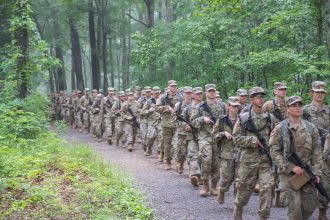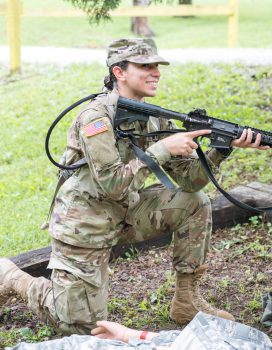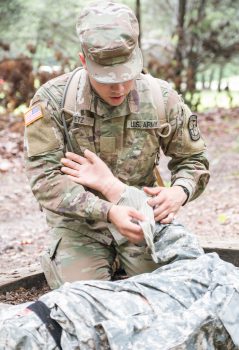With the help of many medics, the Cadets undertook one of their first must-pass events. Cadre and medics teaching each platoon did their best to reiterate that this event was not about speed, it was about efficiency.
“Slow is smooth, smooth is fast,” they would say. The act of slowly walking themselves through the process would help them memorize the most efficient way to treat a combat injury.

Cadets from 1st Regiment, Delta Company arrive at the first aid training site on May 27th at Fort Knox, KY. Cadets will learn how to perform Tactical Combat Casualty Care, otherwise known as TC3, and will be tested on their ability to apply this training in a simulated combat scenario. | Photo by Kyle Gallagher, CST Public Affairs Office
Acting out a simulation in which their battle buddy has suffered different life-threatening injuries, they learned to tie tourniquets, wrap wounds and pull their battle buddy into cover in a slow, yet efficient manner.
“One of the reasons we do this is we need to teach them [Cadets] how to save a life,” said Lt. Col. Danielle Rodondi, professor of military science at Augusta University and the Officer in Charge of the First Aid Station at advanced camp. “That’s what they do here, they learn to treat a casualty under direct and indirect fire.”
TC3 is about training Cadets in first aid that may save a life in combat; any situation they may come across, any casualty they may need to help, is trained at this station of camp.
Rodondi, an Army nurse when not assigned to U.S. Army Cadet Command, said the Army had a 92 percent survival rate in Operation Enduring Freedom (the war in Afghanistan) and Operation Iraqi Freedom (the war in Iraq). She credited the nurses and the “great medics” the Army has, but more importantly the soldiers that have been trained to respond in those situations.
This training is no small deal; it is a must-pass event for a reason, and that reason is the necessity of a fast, efficient response from the first person to reach an injured soldier.

Cadet Karla Enid Jiminez, a student from Corozal attending the University of Puerto Rico, pulls security during first aid training at Fort Knox, KY on May 27. Cadet Jiminez and other cadets from 1st Regiment, Delta Company will learn how to perform Tactical Combat Casualty Care, otherwise known as TC3, and will be tested on their ability to apply this training in a simulated combat scenario. | Photo by Kyle Gallagher, CST Public Affairs Office
As with any must-pass event, many of the Cadets were nervous for the testing portion of the training. Only increasing the stress for some was the fact that this training is also a RECONDO event, and those who pass in one try are still in the running for that award.
RECONDO is awarded to Cadets who’ve proved themselves to have superior skills in certain events at advanced camp.
Cadet Andrew Dietz, from Lake Forest, California, attending California State University Fullerton, arrived with the 1st Regiment on May 23. After a hectic start to his time at advanced camp, he says he’s ready to work as hard as need-be to earn RECONDO.
“I think I can do this,” Dietz said. “Sometimes you just got to hit the ‘I believe’ button and charlie mike.” Dietz is using that same “continue mission” mentality as he hopes to branch quartermaster.

Cadet Andrew Dietz from Lake Forest attending California State University Fullerton, performs first aid training at Fort Knox, KY on May 27th. Cadet Dietz and other cadets from 1st Regiment, Delta Company will learn how to perform Tactical Combat Casualty Care, otherwise known as TC3, and will be tested on their ability to apply this training in a simulated combat scenario. | Photo by: Kyle Gallagher, CST Public Affairs Office
Some were not so confident in their testing ability.
“I’m not as competent, I definitely need to lean on some people,” said Cadet Juan O’Neal from Harris County, Georgia. “But they [other Cadets] seem very awesome as far as being helpful.”
O’Neal is very grateful for his platoon, saying that they’re helping him out where ever they can. Some of his friends in the Eagle Battalion at Stetson University warned O’Neal that he’d be working with very high-speed people, focused only on their own good, but he hasn’t seen anything like that since his arrival.
TC3 has a 99.1 percent first try passing rate, said Rodondi, so the majority of the worrying is misplaced.
The best advice all Cadets are given when learning to save a life is a simple six-word motto:
“Slow is smooth, smooth is fast.”




